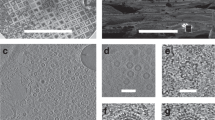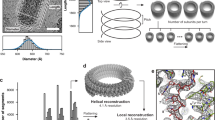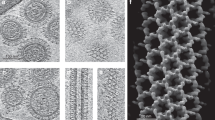Abstract
FOR a close study of the intranuclear cytology of sections of lepidopterous larvæ infected with nuclear polyhedral viruses, it is necessary, in addition to methods for staining the polyhedra1, to have some method for staining the virus bundles which electron microscopy shows are embedded within the polyhedra. It has been found that this can be done readily, and the origin and fate of the virus bundles can then be traced. Owing to the limitations of ordinary light microscopy, the term virus bundle must perforce be used here to include not only bundles of mature virus rods, but also the bodies of a similar character which are liable to become embedded within polyhedra and within which virus rods may differentiate.
This is a preview of subscription content, access via your institution
Access options
Subscribe to this journal
Receive 51 print issues and online access
$199.00 per year
only $3.90 per issue
Buy this article
- Purchase on Springer Link
- Instant access to full article PDF
Prices may be subject to local taxes which are calculated during checkout
Similar content being viewed by others
References
Xeros, N., Nature, 171, 309 (1953).
Komerek, J., and Breindl, V., Lesnicke prace, rocnik 2, 1 (1923).
Author information
Authors and Affiliations
Rights and permissions
About this article
Cite this article
XEROS, N. Origin and Fate of the Virus Bundles in Nuclear Polyhedroses. Nature 172, 548–549 (1953). https://doi.org/10.1038/172548a0
Issue Date:
DOI: https://doi.org/10.1038/172548a0
This article is cited by
-
A Nucleopolyhedrovirus from the Mediterranean flour moth, Ephestia kuehniella (Lepidoptera: Pyralidae)
Applied Entomology and Zoology (2015)
-
Untersuchungen �ber den Verlauf der Granulose bei Raupen von Choristoneura murinana (Hb.) (Lepidopt., Tortricidae)
Archiv f�r die gesamte Virusforschung (1959)
Comments
By submitting a comment you agree to abide by our Terms and Community Guidelines. If you find something abusive or that does not comply with our terms or guidelines please flag it as inappropriate.



